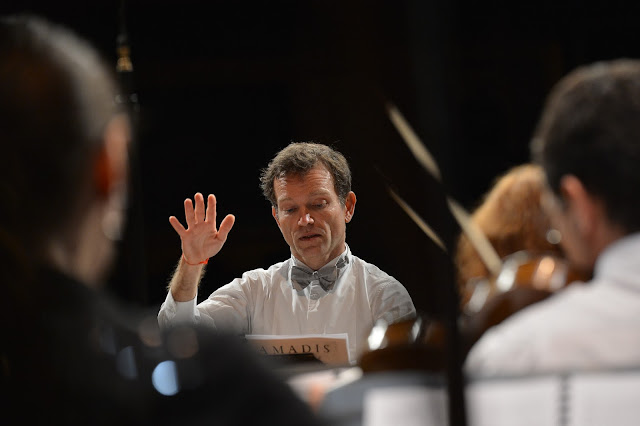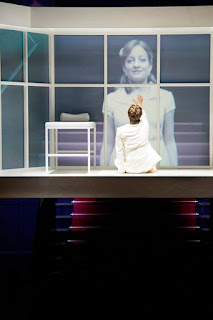 |
| Christophe Rousset & Les Talens Lyriques - copyright Jacques Verrees |
Christophe Rousset founded the vocal and instrumental ensemble Les Talens Lyriques in 1991, and since then has balanced a career which combines that of solo harpsichord work, directing Les Talens Lyriques, conducting other ensembles and doing research into French baroque music.
 |
| Laura Scozzi's production Rameau's Les Indes Galante copyright Patrice Nin |
'this worked well with Rameau's music',
as Christophe sees the libretto
as being rather weak
For the Turkish act, passports are being organised for immigrants, a scene which has become even more relevant since the production premiered. Christophe says that this worked well with Rameau's music, especially as he sees the libretto as being rather weak and simply a frame for the divertissements (the issue of Rameau's librettos was a subject to which we would return in our interview). The Peru act was set around the drug system, highlighting the position of women in a macho world, whilst the Persian act was of course set in modern Iran with issues of women being veiled and finally the American act looked at the environmental disasters caused by man.
There have been productions where 'you know it will be crap from the beginning'
 |
| Rameau's Zoroastre at Drottningholm |
He has nothing against modern productions at all. Whilst in the performance of the music, he is trying to be as authentic as possible, he does not see the need to be the same on stage and in fact says that 17th century reconstructions are not necessarily interesting. When I ask him what for him are the productions which worked well he highlights his work at Drottningholm Theatre (where the theatre and stage machinery survive from the 18th century), on Handel's Tamerlano and Alcina and Rameau's Zoroastre director Pierre Audi used a combination of modern staging with wonderful 17th century style costumes. Christophe comments that passions depicted in the operas are always the same, and there are many ways to make pieces work on stage. Another production he highlights is Cherubini's Medee in Brussels (directed by Krzysztof Warlikowski) where the production was very modern and referenced Amy Winehouse. Christophe felt the direct had a very interesting way of using the fact that Medee comes from an Oriental world into a Greek world which fitted the drama well.
Passions depicted in the operas are always the same,
and there are many ways to make pieces work on stage
 |
| Nadja Michael as Medee, ©Maarten Vanden Abeele |
He makes the comment that Rameau works better in places like the UK, where the audience cannot understand how poor the poetry of the libretto is. A case in point is Zais which he and Les Talens Lyriques have recently released on CD. You can certainly find the libretto weak; as with Zoroastre it revolves Magic Flute-like around a form of Masonic initiation all placed in a pastoral framework. But the music is gorgeous and the overture is very surprising, with its evocation of Chaos, the rising sun, storms and so many things. Christophe also highlights a beautiful lament for the character Zelidie, but I sense that he could also continue to discourse on the other beauties of the score. (Listening to an advance copy of the recording after our interview, I was very taken with the beauty and imagination of the music).
Rameau works better when the audience cannot understand
how poor the poetry of the libretto is
 | |
| Mariame Clement's production of Rameau's Castor et Polluxin Vienna |
For Christophe the music is the thing in Rameau's operas, whereas he feels that Lully's texts are much better. Also, as Lully invented the form of the tragedie lyrique he can be more inventive and allow himself to break his own rules. So in Lully's operas you not only have strong dramatic situations but good texts and plots. He highlights Persee with its combination of tragic and heroic, with situations like Perseus rescuing Andromeda. But of course, such dramas need a good staging and spectacular stage machinery, though Christophe feels that nowadays video offers a good alternative.
Christophe calls Lully's music 'incredible'
Christophe calls Lully's music 'incredible' but says that you have to understand that there is 60 years difference between Lully's operas and Rameaus so that inevitably they will not sound the same. And of course Lully was a huge influence on Handel, Purcell and the French school. But Rameau did not change the essential nature of the tragedie lyrique and it would have to wait for Gluck to come to Baris and break the form.
Christophe has just performed Lully's Armide in Nancy directed by David Hermann and was surprised at how much the audience loved it. Christophe thinks Lully's operas really work on stage in the theatre and the Nancy production used a mixture of modern and 17th century images using them to delineate when the action moved from one world to another. The drama was easy to understand and all of the dances were gorgeous (rather than pompous). This production used a lot of video to make the enchanting scenes work well.
 |
| David Hermann's production of Lully's Armide © Opéra national de Lorraine |
For both Rameau and Lully, a good production needs to start from a good choreographer and with the recent Les Indes Galantes it helped that Laura Scozzi did both the directing and choreography.
Having no voice himself, but he loves working with singers
and feels that he sings through them
Christopher still balances playing the harpsichord, directing his ensemble and others, and doing research. But he has no grand plan, and says that it 'just happens', so that projects come along which allow him to give space to his different interests. And he likes to have a mix of different activities rather than concentrating on one. He still enjoys directing his ensemble from the harpsichord, and feels that it is important for his ensemble to see that he is still a player, and he likes playing with the recitative. He admits to having no voice himself, but he loves working with singers and feels that he sings through them.
 |
| Rameau's Platee - photo Alain Kaiser |
Repertoire from Lully to Saint-Saens and even Verdi.
He enjoys doing
these things, but admits that in his head he remains a harpsichord
player.
Whilst Christophe is known for his specialism in baroque opera, he has made what he terms 'experiments' in more recent repertoire including conducting Rossini's La Scala di Seta at La Scala (in Damiano Michieletto's production), conducting Beethoven and performing with soprano Veronique Gens in repertoire from Lully to Saint-Saens and even Verdi. He enjoys doing these things, but admits that in his head he remains a harpsichord player. That said he describes conducting Beethoven as fantastic, commenting that to conduct Handel you need a sense of the style and a good relationship with the players, but Beethoven is more complex and can give great satisfaction.
Doing such research is important to him, and he enjoys going to libraries and making discoveries. Whilst there is regret that pieces by Monteverdi and Couperin have disappeared, it is always nice to opening a book and have a piece spreading out before you. Sometimes he realises that a piece will not work, but often he looks a one and feels he wants to do it. And of course, you have to perform the music to make it accessible. His future plans include a tour with mezzo-soprano Ann Hallenberg performing music written for the great castrato Farinelli. Christophe conducted the music for the film Farinelli and so the concerts with Ann Hallenberg will include well known numbers from the film, alongside more unusual repertoire and he regards this as an opportunity to enlarge the repertoire.
Elsewhere on this blog:
- Handel survey: Handel in Italy from Bridget Cunningham - CD review
- Charm and delight: The Cunning Little Vixen from British Youth Opera - opera review
- Technology and class in the development of opera and concert-going - feature article
- Missed opportunity: Prom 65, Alice Coote in Handel - concert review
- Colour and Drama: Mozart and more from Anneke Scott and Ironwood - CD review
- An Avila Diary: My adventures singing triple-choir music by Victoria and Vivanco under Peter Phillips in Spain - feature article
- Serious, independent, fascinating: Music by Edward McGuire from Red Note - CD review
- Charm: Wolf-Ferrari's Suite Veneziana - CD review
- Undeservedly forgotten: Music by Roger Sacheverell Coke - Cd review
- Wartime consolations: Linus Roth plays music by Weinberg and Hartmann which deserves to be heard
- Towering achievement: Beethoven's Diabelli Variations from Nick van Bloss - CD review
- Family connections: Alissa Firsova Russian Emigres - CD review
- Volume 5 of Malcolm Martineau's survey of Poulenc Songs - CD review
- Contemporary opera is alive and well and living in Kings Cross: Tete a Tete festival - opera review
- New voice from Iceland: Hugi Gudmundsson's Calm of the Deep - CD review
- Home











No comments:
Post a Comment